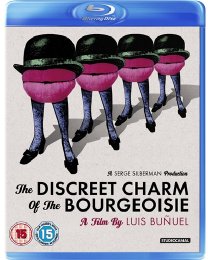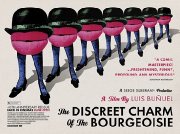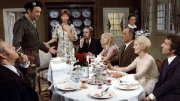Review for The Discreet Charm Of The Bourgeoisie
I should start by saying that this is a mighty fine high definition transfer of a very fine film. I have the DVD that forms part of the Bunuel box set which is a perfectly acceptable transfer. But this is much better than that. So worth the double-dip. That neatly sums up the review for those who already know and love this incredible film. For those that don't - well, stick around. You're missing something very special.
My favourite Bunuel film (and I've seen most) is without doubt 'The Exterminating Angel', a film produced during Bunuel's Mexican period, which has many parallels with this film. (My copy came free with a newspaper so I guess you could pick up a copy cheaply on EBAY). 'The Exterminating Angel' is about a group of diners who join a wealthy business man for dinner at his house. But for some reason, try as they might, none of the guests seem able to leave. Some compulsion seems to be preventing them. It's a film full of mundane and arguably bourgeoisie happenings, but with a surreal dream-like quality that is both darkly surreal and amusing. Much the same could be said of the more humourous 'The Discreet Charm of the Bourgeoisie' which uses pretty much the same formula - the seemingly inane mixed with dreams, and even dreams within dreams.
It's arguably a really good film to introduce yourself to the works of Bunuel. It's both accessible and funny - not a heavy film by any stretch. Indeed, coming a decade after 'The Exterminating Angel', it won an Oscar for the Best Foreign Language Film in 1972. It remains to a large degree a timeless piece with only the Paris cars giving the date away to contemporary audiences.
It's amusing that Bunuel carried his surrealistic and political sensibilities with him for so many years after his dalliance with Dali whilst at University together in the 1920's ('Un Chien Andalou' and the magnificent 'L'age Dor'). Fifty years on and whilst the subject matter may have mellowed somewhat (dinner parties in the main), the surrealist fascination with alternate realities and dreams had not.
The film starts with a situation that had happened to Bunuel just a few weeks before filming began when three guests arrive at a house for a dinner party and find that their host had been expecting them the following day and was out for dinner elsewhere himself. His wife, dressed in a dressing gown and slippers, agrees to go to dinner with them and they end up at an empty restaurant which at first appears to be closed. However, they are persueaded to stay and they begin their meal. However, it transpires that the owner has died and his body is still laid out in the back room. (Sounds a bit Lynchian? You wouldn't be the first to point that out!).
When the guests return to the original hosts on Sunday for a meal they are left waiting whilst he and his wife make love in the bedroom, clearly frustrated by the interruption. To avoid their friends hearing the wives cries, they climb down the trellis and continue their love making in the garden. In the meantime their guests drink Martini and eventually leave.
Next comes a knock on the door and there stands a man in their recently sacked gardener's clothes who is not their usual gardener. He claims to be a bishop but has no proof - so is dismissed.
And so it goes. Normal yet not normal.
Focussing around five key friends, a recurring theme is their inability to ever complete a meal. When the ladies attempt to get tea at a local hotel café they are interrupted by a soldier who tells them tales of his haunted childhood. By the time he leaves the café have completely run out of any refreshments.
The surrealist climax is that, when the guests finally manage to sit down for a meal together, the curtain at the back of the room raises and it transpires that they are actually on stage in a theatre.
It's a lot more fun than it sounds with some magnificent characterization.
Extras on this fine disc are scant but worthy with a trailer and an illuminating 'to camera' interview with Bunuel biographer and devotee Peter Evans. It's a well- informed analysis of Bunuel in general and this film in particular.
The picture is utterly breath-taking on this edition making the film look so much more vibrant than I had remembered it to be. Well worth picking up.
































Your Opinions and Comments
Be the first to post a comment!